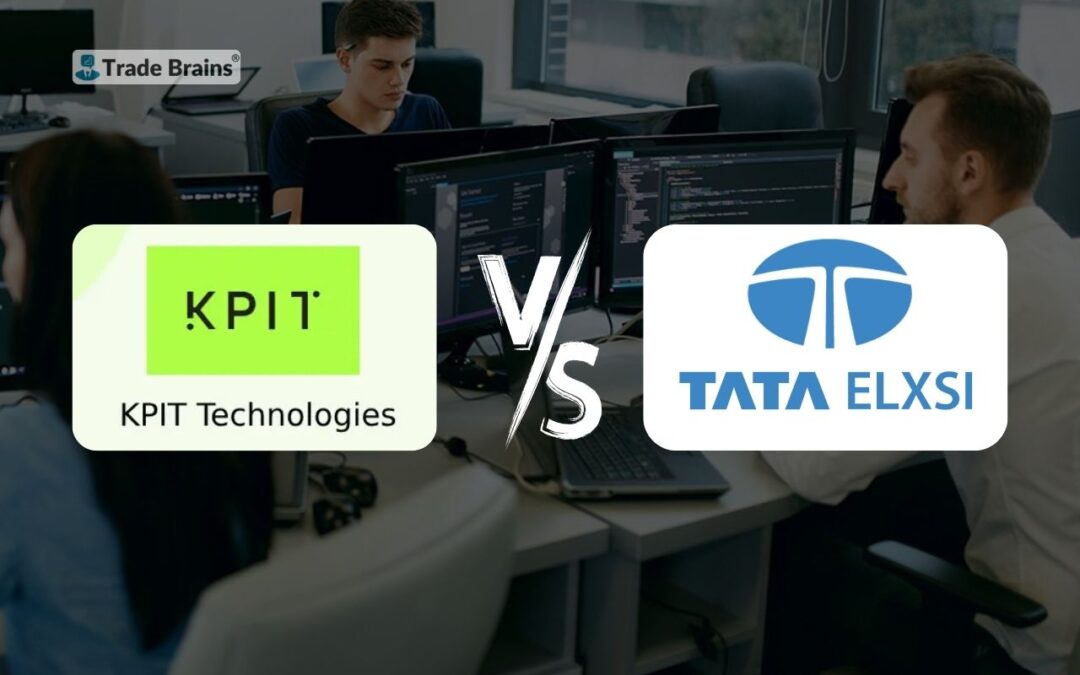Synopsis:
KPIT Technologies delivered steady revenue growth with robust deal wins but saw profitability hit by currency losses in Q1FY26. Tata Elxsi reported declines across revenue and profit, though transportation and new strategic deals offered resilience. which stock offers the better opportunity?
The engineering R&D and automotive technology services sector is witnessing strong competition as Indian IT firms with niche domain expertise capture global demand in software-defined vehicles, connected mobility, and healthcare technologies. Among the listed players, KPIT Technologies and Tata Elxsi stand out with contrasting Q1FY26 performances, deal wins, and strategic expansions, raising the key investor question: which stock offers the better opportunity?
KPIT Technologies Ltd
KPIT Technologies is a global technology company enabling next-generation mobility with embedded software, AI, and digital solutions. With more than 13,000 employees, it operates development centers in Europe, the USA, Japan, China, Thailand, and India. The company has a market capitalization of Rs. 32,841 crore, and its stock is trading at Rs. 1,198.
In Q1FY26, KPIT reported revenue of Rs. 1,539 crore, rising 0.7 percent sequentially from Rs. 1,528 crore and 12.7 percent year-on-year from Rs. 1,365 crore. Operating profit fell 8.7 percent QoQ from Rs. 323 crore to Rs. 295 crore but was up 2.4 percent YoY from Rs. 288 crore. Profit before tax dropped 25.3 percent QoQ from Rs. 316 crore to Rs. 236 crore and declined 14.8 percent YoY from Rs. 277 crore. Net profit stood at Rs. 172 crore, down 29.8 percent QoQ from Rs. 245 crore and down 15.7 percent YoY from Rs. 204 crore.
Operationally, KPIT maintained its streak of 20 consecutive quarters of revenue growth. However, currency headwinds impacted profitability, with other income falling sharply to a negative Rs. 81 million compared to a gain of Rs. 191 million in Q4FY25, creating a net sequential drag of Rs. 272 million. Despite this, KPIT closed new engagements worth USD 241 million, reflecting a robust deal pipeline.
The company’s strategic wins in Q1 included a collaboration with JSW Motors to power India’s New Energy Mobility revolution, where JSW is investing USD 3 billion over five years. It also secured AI-led platform validation from a leading American carmaker, electric powertrain programs with European and Asian OEMs, and connected vehicle diagnostics for a top European commercial vehicle manufacturer. Further strengthening its global footprint, KPIT inaugurated new technology centers in Gothenburg, Sweden, and Tunisia.
Its Q1 revenue mix stood at USD 145.42 million from passenger cars and USD 26.32 million from commercial vehicles, with Europe contributing USD 78.83 million, the USA USD 51.87 million, and Asia USD 47.07 million. Notably, 62.5 percent of revenues came from fixed-price contracts, and 87.4 percent of the total revenue came from strategic clients.
Tata Elxsi
Tata Elxsi is one of the world’s leading providers of design and technology services across industries, including automotive, communications, media, and healthcare. It operates with a global network of design studios and development centers. The company has a market capitalization of Rs. 34,753 crore, with the stock currently priced at Rs. 5,579.
In Q1FY26, Tata Elxsi posted revenue of Rs. 892 crore, slipping 1.8 percent QoQ from Rs. 908 crore and 3.7 percent YoY from Rs. 926 crore. Operating profit fell 10.1 percent sequentially from Rs. 208 crore to Rs. 187 crore and dropped 25.8 percent YoY from Rs. 252 crore. Profit before tax came in at Rs. 196 crore, down 11.3 percent QoQ from Rs. 221 crore and 22.2 percent YoY from Rs. 252 crore. Net profit stood at Rs. 144 crore, down 16.3 percent sequentially from Rs. 172 crore and 21.7 percent YoY from Rs. 184 crore.
From an operational perspective, Tata Elxsi’s transportation business contributes more than 50 percent of revenue, delivered 3.7 percent QoQ growth and exited flat in constant currency terms. However, revenue from media and communications fell 5.5 percent QoQ, while healthcare and life sciences dropped 6.5 percent QoQ.
In terms of geography, Europe accounted for 39.5 percent of revenue, the Americas 30.1 percent, India 19.8 percent, and the rest of the world 10.5 percent. Offshore work dominated at 73.1 percent of revenue, while onsite contributed 26.9 percent. Revenue concentration remains high with 54.6 percent from the top 10 clients. Notably, 51.9 percent of revenues came from fixed-price contracts.
The quarter saw multiple high-profile deal wins, including a multi-million-dollar digital design deal with a US tech major, a connected vehicle platform engagement for a global agrimachinery manufacturer, and an advanced ADAS-led off-road vehicle program. Tata Elxsi also signed strategic agreements in healthcare, including with a global pharma leader for connected infusion devices and with ECOSEP to apply AI and ML solutions in sports medicine.
Additionally, its collaboration with Mercedes-Benz Research and Development India focused on vehicle engineering and software-defined vehicle programs, further strengthening its positioning in the automotive software space.
Conclusion
KPIT Technologies and Tata Elxsi highlight differing strengths for investors to consider. KPIT continues to deliver steady revenue growth supported by strong deal wins and global expansion, though profitability remains under pressure from currency headwinds. Tata Elxsi, meanwhile, leverages deep client relationships and leadership in transportation, even as media and healthcare softness weigh on performance. Both companies are strategically positioned in the automotive and digital engineering space.
Written by Manan Gangwar
Disclaimer

The views and investment tips expressed by investment experts/broking houses/rating agencies on tradebrains.in are their own, and not that of the website or its management. Investing in equities poses a risk of financial losses. Investors must therefore exercise due caution while investing or trading in stocks. Trade Brains Technologies Private Limited or the author are not liable for any losses caused as a result of the decision based on this article. Please consult your investment advisor before investing.


